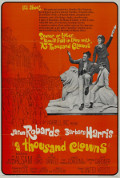
Directed by
Fred Coe
118 minutes
Rated PG
Reviewed by
Bernard Hemingway

Thousand Clowns, A
Although being in black and white and hobbled by low production values making it look older A Thousand Clowns is a Zeitgeist film in the anti-Establishmentarian spirit of Karel Reisz’s Morgan (A Suitable Case For Treatment) (1966) with a sprinkling of Louis Malle’s Zazie Dans Le Metro (1960) in reverse.
Jason Robards plays Murray, a willfully unemployed, self-styled non-conformist writer of a children’s television show who disdains the straight world and lives in a one-room apartment in New York with his twelve year old nephew, Nick (Barry Gordon), of whom he has been the guardian since the kid was left with him by his errant mother when he was six.
A visit from a pair of social workers (William Daniels and Barbara Harris) places Murray in the quandry of having to choose between his preferred lifestyle (a freewheelin’ kookiness emphasized by the film’s music) and a job which the authorities require him to have if he wants to keep Nick.
Scripted by Herb Gardner based on his own stage play, which had also been directed by the film’s director, A Thousand Clowns is very talky and despite Robards and Gordon working well together (they had been in the play as had Gene Saks who appears as the kid’s show host) what was evidently considered boldly provocative back then (a self-realized life) is now taken for granted as a universal goal and all the bally-hooing about freedom feels dated, strained and unnecessarily protracted. Martin Balsam won a Best Supporting Actor Oscar for a performance that was little more than one scene late in the film.
Somewhat ironically, since it was not part of the stage play, the only aspect of the film to retain any real interest these days is the depiction of Manhattan of the time - in particular the docks, Ellis Island and the Statue of Liberty, Central Park, Wall Street and Greenwich Village, locations which although all nicely photographed by Arthur J. Ornitz look positively yesteryear.
Want something different?





